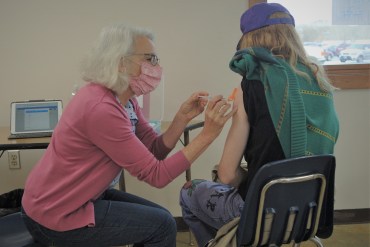‘Red Flag’ Gun Laws Get Another Look After Indiana, Colorado Shootings
It’s unclear whether “red flag” laws — which allow the seizure of guns from a person deemed dangerous — help prevent mass shootings or should have been applied to the suspects in recent shootings in Boulder, Colorado, and Indianapolis.
Only One Vaccine Is OK’d for Older Teens. It’s Also the Hardest to Manage in Rural America.
Of the three covid vaccines the U.S. government has authorized, only one is available to 16- and 17-year-olds: the Pfizer shot. It’s also the most complicated to manage in rural settings, with their small, dispersed populations. That forces some teens and their families to travel long distances for a dose — or go without.
From Rotten Teeth to Advanced Cancer, Patients Feel the Effects of Treatment Delays
Health providers are seeing the consequences of pandemic-delayed preventive and emergency care, from longer hospital stays to more root canals.
Public Health Experts Worry About Boom-Bust Cycle of Support
Congress has poured tens of billions of dollars into public health since last year. While health officials who have juggled bare-bones budgets for years are grateful for the money, they worry it will soon dry up, just as it has after previous crises such as 9/11, SARS and Ebola. Meanwhile, they continue to cope with an exodus from the field amid political pressure and exhaustion that meant 1 in 6 Americans lost their local health department leader.
Snag a Vaccine Appointment, Then Face the Next Hurdle: How to Get There?
For some, a vaccine appointment a few hours away is no biggie. For others, it’s a major barrier to gaining protection from the coronavirus.
What Covid Means for the Athlete’s Heart
As athletes at all levels resume their sports, what risks do their hearts carry if they’ve had covid? Initial data shows the risk may be low but still possibly deadly.
Montana Sticks to Its Patchwork Covid Vaccine Rollout as Eligibility Expands
Montana’s overstretched counties and tribal governments have developed a mishmash of policies and plans that require ingenuity and mutual support to work. A reporting project by KHN, Montana Free Press and the University of Montana School of Journalism finds the biggest test of that disparate system looms as vaccine eligibility expands. Plus: a county-by-county guide to vaccine availability in Montana.
Durango’s Covid ‘Cowboy’ Rounds Up Spring Break Scofflaws, Lines ’Em Up for Shots
The city of Durango has hired an actor to bring his Old West acting skills to tackle a current problem: the Wild West of spring break, in which visitors from states such as Texas and Oklahoma flock to town. The “lawman” cajoles them into wearing masks while vaccinators stand ready for out-of-town visitors.
Getting a Prescription to Die Remains Tricky Even as Aid-in-Dying Bills Gain Momentum
Access to physician-assisted death is expanding across the U.S., but the procedure remains in Montana’s legal gray zone more than a decade after the state Supreme Court ruled physicians could use a dying patient’s consent as a defense.
Nosing In on Kids Who Had Covid and Lost Their Sense of Smell
Clinicians at pediatric hospitals are experimenting with “smell training” among children who had covid-19 and have now lost this sense.
Covid-Inspired Montana Health Insurance Proposal Wouldn’t Kick In for 2 Years
Montana is looking to join most other states in requiring small businesses to offer laid-off employees temporary continuity of their health care plans. But the bill, if it passes, likely won’t take effect in time to help people directly affected by the pandemic.
Need Amid Plenty: Richest US Counties Are Overwhelmed by Surge in Child Hunger
Hunger among kids is skyrocketing, even in America’s wealthiest counties. But given the nation’s highly uneven charitable food system, affluent communities have been far less ready for the unprecedented crisis than places accustomed to dealing with poverty and hardship.
For Spring Season, Young Athletes Get Back in the Game Despite Covid Risk
With schools opening up classrooms, millions of young athletes are also getting out on fields and courts. But pandemic precautions and delays are spurring conflicts among parents, coaches and doctors.
The Boom in Out-of-State Telehealth Threatens In-State Providers
Health provider conflicts, fraud and access disparity temper the covid telehealth revolution.
A Year Into the Pandemic, Three Huge Losses in One Family
The Aldaco family of Phoenix suffered more than most in this year of unfathomable losses. Three brothers perished in the pandemic: Jose in July, Heriberto in December and Gonzalo in February.
What Childhood Vaccine Rates Can, and Can’t, Teach Us About Covid Vaccines
Hesitancy toward routine childhood vaccines doesn’t necessarily predict hesitancy toward a covid shot.
Without a Pandemic Safety Net, Immigrants Living Illegally in US Fall Through the Cracks
Many undocumented immigrants are essential workers at high risk of exposure to the virus — and the pandemic’s economic crash — with no direct access to federal financial lifelines available to U.S. citizens.
Pandemic Aid Package Includes Relief From High Premiums
Experts say the two-year expansion of subsidies for most people who buy insurance through the government exchanges would be among the most significant changes to the affordability of private insurance since the passage of the Affordable Care Act.
Push Is On for States to Ban Organ Transplant Discrimination
States are passing laws that would prevent people with Down syndrome, autism and other disabilities from being denied transplants solely because of their conditions.
Rural Americans in Pharmacy Deserts Hurting for Covid Vaccines
Pharmacies are poised to start filling the gaps to vaccinate all of America against covid. Where does that leave people in rural counties that lack pharmacies?



























